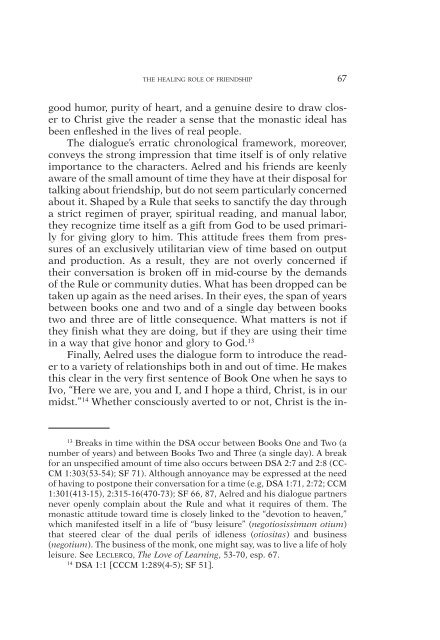Avant-propos - Studia Moralia
Avant-propos - Studia Moralia
Avant-propos - Studia Moralia
You also want an ePaper? Increase the reach of your titles
YUMPU automatically turns print PDFs into web optimized ePapers that Google loves.
THE HEALING ROLE OF FRIENDSHIP 67<br />
good humor, purity of heart, and a genuine desire to draw closer<br />
to Christ give the reader a sense that the monastic ideal has<br />
been enfleshed in the lives of real people.<br />
The dialogue’s erratic chronological framework, moreover,<br />
conveys the strong impression that time itself is of only relative<br />
importance to the characters. Aelred and his friends are keenly<br />
aware of the small amount of time they have at their disposal for<br />
talking about friendship, but do not seem particularly concerned<br />
about it. Shaped by a Rule that seeks to sanctify the day through<br />
a strict regimen of prayer, spiritual reading, and manual labor,<br />
they recognize time itself as a gift from God to be used primarily<br />
for giving glory to him. This attitude frees them from pressures<br />
of an exclusively utilitarian view of time based on output<br />
and production. As a result, they are not overly concerned if<br />
their conversation is broken off in mid-course by the demands<br />
of the Rule or community duties. What has been dropped can be<br />
taken up again as the need arises. In their eyes, the span of years<br />
between books one and two and of a single day between books<br />
two and three are of little consequence. What matters is not if<br />
they finish what they are doing, but if they are using their time<br />
in a way that give honor and glory to God. 13<br />
Finally, Aelred uses the dialogue form to introduce the reader<br />
to a variety of relationships both in and out of time. He makes<br />
this clear in the very first sentence of Book One when he says to<br />
Ivo, “Here we are, you and I, and I hope a third, Christ, is in our<br />
midst.” 14 Whether consciously averted to or not, Christ is the in-<br />
13 Breaks in time within the DSA occur between Books One and Two (a<br />
number of years) and between Books Two and Three (a single day). A break<br />
for an unspecified amount of time also occurs between DSA 2:7 and 2:8 (CC-<br />
CM 1:303(53-54); SF 71). Although annoyance may be expressed at the need<br />
of having to postpone their conversation for a time (e.g, DSA 1:71, 2:72; CCM<br />
1:301(413-15), 2:315-16(470-73); SF 66, 87, Aelred and his dialogue partners<br />
never openly complain about the Rule and what it requires of them. The<br />
monastic attitude toward time is closely linked to the “devotion to heaven,”<br />
which manifested itself in a life of “busy leisure” (negotiosissimum otium)<br />
that steered clear of the dual perils of idleness (otiositas) and business<br />
(negotium). The business of the monk, one might say, was to live a life of holy<br />
leisure. See LECLERCQ, The Love of Learning, 53-70, esp. 67.<br />
14 DSA 1:1 [CCCM 1:289(4-5); SF 51].

















